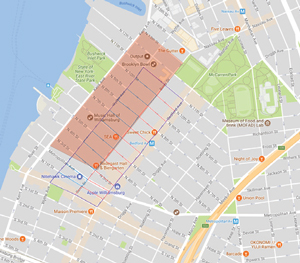Retailers kicking tires in the growing Williamsburg retail district have more than changing shopping habits to worry about.
The looming L train shutdown has put the brakes on leasing activity in the Brooklyn neighborhood, where the vacancy rate is roughly 13 percent, according to a recent analysis by The Real Deal.
Tenants “are reluctant to do a deal until the train situation is resolved,” said Jason Pruger, a retail broker with Newmark Knight Frank.
Last month, TRD walked a 22-block swath of central Williamsburg — from Grand Street to North 11th Street and from Bedford Avenue to Wythe Avenue — and checked on the nearly 600 buildings there, finding 105,000 square feet of vacancies out of the area’s total 827,000 square feet of retail.
While “for rent” signs are spread around the neighborhood, the two streets with the most empty storefronts are Bedford Avenue, Williamsburg’s main shopping stretch, and North 6th Street.
 Bedford Avenue has approximately 26,000 square feet of vacancies out of its total of about 212,000 square feet of retail space, according to TRD ’s survey. That’s a vacancy rate of about 12 percent. It’s also the priciest retail corridor in the borough, with rents along the street averaging $325 per square foot, according to a report from the Real Estate Board of New York. Yet that average is a 13 percent decline from a year ago, when the average asking rent was $373 per foot.
Bedford Avenue has approximately 26,000 square feet of vacancies out of its total of about 212,000 square feet of retail space, according to TRD ’s survey. That’s a vacancy rate of about 12 percent. It’s also the priciest retail corridor in the borough, with rents along the street averaging $325 per square foot, according to a report from the Real Estate Board of New York. Yet that average is a 13 percent decline from a year ago, when the average asking rent was $373 per foot.
Meanwhile, North 6th Street has roughly 22,000 square feet of empty storefronts — primarily sandwiched between Berry and Wythe avenues — out of about 89,000 square feet of retail, for a vacancy rate of 25 percent.
Repairs to the L train’s Canarsie Tunnel will span 15 months, starting in April 2019. Though L trains will operate within Brooklyn, there will be no service connecting the borough to Manhattan. Some retail tenants are spooked by what the closure could mean for their businesses, and there are rumblings about requests for rent reductions.
Christine Blackburn of brokerage Compass said there was a pause in Williamsburg’s retail leasing market after the shutdown was announced last year.
“Everybody took three months to digest that information,” she said. Blackburn estimated that some existing tenants will push for rent reductions of between 5 and 7 percent, though no more than that.
Lee & Associates NYC’s Garry Steinberg, a broker who represents both tenants and landlords in the area, pointed to a clutch of retailers that have recently inked leases in the area.
 Athleisure clothing retailer Lululemon and Korean fashion brand Aland signed on for Williamsburg storefronts this year, at 129 North 6th Street and 92 North 6th Street, respectively. In September, Japanese clothing and home furnishing store Muji opened at 55 North 5th Street, and Vans opened an outpost called the General at 102 North 6th Street. And Steinberg recently brokered a deal for athletic apparel store Respect Your Universe, which will open for business at 76 North 4th Street in 2018.
Athleisure clothing retailer Lululemon and Korean fashion brand Aland signed on for Williamsburg storefronts this year, at 129 North 6th Street and 92 North 6th Street, respectively. In September, Japanese clothing and home furnishing store Muji opened at 55 North 5th Street, and Vans opened an outpost called the General at 102 North 6th Street. And Steinberg recently brokered a deal for athletic apparel store Respect Your Universe, which will open for business at 76 North 4th Street in 2018.
“There are many businesses coming to Williamsburg,” Steinberg said. “And the traffic they are looking for is Brooklyn-to-Brooklyn.”
Even so, Steinberg said he is discussing concessions with a few retailers. He is actively negotiating a concession on behalf of a prospective tenant that would seek a rent reduction if sales decrease because of the train shutdown. Steinberg did not disclose the identity of the tenant.
Stores that focus on Brooklyn-based shoppers entertain the idea that sales could actually increase as travel to Manhattan is made more difficult, some brokers said.
Meanwhile, some Williamsburg landlords are willing to keep their retail spaces empty instead of rushing to sign on new tenants at lower rents.
Donal Flaherty of Brooklyn-based investment sales brokerage Bestreich Realty said locking in a tenant at a lower rate for a contract that would last much longer than the L train shutdown just doesn’t make sense in the long term. Landlords would rather wait until the L train opens again and seek a higher-paying tenant at that time.
“I don’t think anyone’s worried,” Flaherty said. “A lot of these guys have so much capital that two years will go by in the blink of an eye.”
Compass’s Blackburn said that the shock of the shutdown was waning, and she expects the market to pick up again soon.
“The closer we get to the shutdown,” she said, “the closer we get to the end of the shutdown.”
